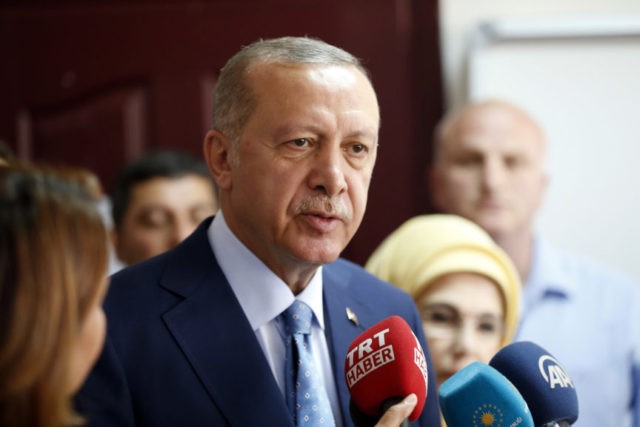Turkish President Recep Tayyip Erdoğan celebrated his election victory Sunday, declaring that “the sufferers of our region and all oppressed in the world” won the election as opposition leaders and international observers decry widespread arrests, ballot irregularities, and censorship.
Despite most opposition candidates being effectively banned from television after Erdoğan shut down over one hundred media outlets in 2016 – and one presidential candidate facing 183 years in prison for criticizing Erdoğan’s policy on Kurdish Turkey – Erdoğan barely secured a simple majority on Sunday. According to the Turkish state-run Anadolu News Agency, Erdoğan received 52.56 percent of the vote. Primary opposition candidate Muharrem İnce of the Republican People’s Party (CHP) received 30.64 percent of the vote; imprisoned Kurdish candidate Selahattin Demirtaş received 8.4 percent, and Meral Akşener, representing the debut of the nationalist Iyi (Good) Party, received 7.29 percent of the vote.
A map detailing how the vote broke down finds that Erdoğan dominated most of heartland rural Turkey, İnce did best with the urban vote, and Demirtaş locked down most states in the Kurdish-populated southwest. Edirne, the northeast city where Demirtaş is being held without a trial, went for İnce.
In the parliamentary election, Erdoğan’s Islamist Justice and Development Party (AKP) retained the plurality with 42.56 percent of the vote. They will govern in a coalition with the Nationalist Movement Party (MHP), a traditional ally of the AKP. Demirtaş’ secularist, left-wing People’s Democratic Party (HDP) received 11.7 percent of the vote, increasing its voting block in parliament and avoiding dropping below the ten percent threshold necessary to be represented in the legislature.
The results of the election ensure that Erdoğan will rule through 2023. As Turkey voted in favor of switching from a parliamentary to a presidential system in 2017, this election completes that transition, and Erdoğan will acquire new and expansive presidential powers. The Turkish constitution, designed for a parliamentary system, does not provide the checks on presidential powers common to systems like America’s, leaving little opposition to any desired actions Erdoğan will want to take.
Independent observers complained that the context of the election made it impossible for Turks to vote freely. Members of the Organization for Security and Cooperation in Europe (OSCE), who traveled to Turkey to witness the election, said that opposition candidates were not provided an equal opportunity to campaign against Erdoğan, skewing the results.
“The restrictions we have seen on fundamental freedoms have had an impact on these elections. I hope that Turkey lifts these restrictions as soon as possible,” Ignacio Sanchez Amor, head of the OSCE short-term observer mission in Turkey, said following the vote.
As the government controls many of the nation’s media outlets and has shut down most vehicles for opposition opinions in the country, Erdoğan vastly eclipsed his rivals in television presence through the election. According to Reuters, voters saw 67 hours of Erdoğan on television and seven hours of İnce.
The Turkish government also moved to block some international observers from entering the country. Jabar Amin, a Kurdish member of the Swedish Parliament, was arrested and deported late last week after entering the country to serve as an OSCE monitor. The Turkish newspaper Hurriyet notes that ten foreigners were arrested for “posing” as election observers, according to a government statement: three French citizens, three German citizens, and four Italians.
Ankara allowed 415 observers into the country in that official capacity.
Turkish police swiftly rounded up at least six people the night before elections on charges of “insulting the president,” a crime in Turkey.
“Prosecutors in the Aegean province of İzmir had launched an investigation after social media footage showed a group of supporters of the main opposition Republican People’s Party (CHP), allegedly insulting Erdoğan while ‘consuming alcohol’ before attending an election rally held by presidential runner and Erdoğan’s main rival Muharrem İnce,” Hurriyet reports.
The CHP has officially protested irregularities at voting stations, as well. The head of the CHP, Kemal Kilicdaroglu, said that the party had evidence of fraud and would demand investigations into individual cases.
Hurriyet notes that Turkey’s Supreme Election Board (YSK) will analyze some complaints of vote rigging, including a complaint that observers were attacked while attempting to do their jobs at polling stations and another that individuals of unknown affiliation attempted to stuff ballots with “official” votes.
Demirtaş has not yet alleged any fraud, instead celebrating that the HDP expanded its support base in Parliament. “Passing the threshold amid state of emergency principles and pressure … This is a big success,” he said in a tweet posted by his attorneys to his account. He nonetheless referred to the campaign as an “unjust an unequal election race,” noting that he was forced to stage “e-rallies” on Twitter from his prison cell for having defied Erdoğan publicly.
Erdoğan celebrated his renewed ironclad grip on power as a victory for all in a speech Sunday. “The winners of the June 24 elections are Turkey, the Turkish nation, the sufferers of our region and all oppressed in the world,” he asserted. “In this term, we will be before our nation and make up for our shortcomings. Starting from tomorrow, we will be in a rush trying to deliver on promises that we have made to our nation.”
“Turkey has decided to take the side of growth, development, investment, enrichment and a reputable, honorable and influential country in all areas in the world,” Erdoğan concluded.

COMMENTS
Please let us know if you're having issues with commenting.